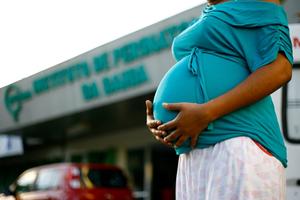Brazilian Presidential Candidates Downplay Religious and Social Issues
Incumbent Dilma Rousseff and challenger Aécio Neves shy from controversy, after a third candidate’s campaign collapsed following a flip-flop on same-sex ‘marriage.’

BRASILIA, Brazil — Less than a week before Brazil’s 2014 presidential election run-off, incumbent President Dilma Rousseff and challenger Aécio Neves stand less than two percentage points apart, according to a Oct. 15 poll conducted by Datafolha.
The poll, which surveyed 9,081 residents across the country, has Neves ahead with 45 percent of the popular vote and Rousseff with 43 percent. With a margin of error of plus or minus two percentage points, the numbers are close enough to consider the race equal.
Brazil has the world’s largest population of Catholics, who constitute 65% of the nation’s 202 million inhabitants, according to the CIA World Factbook. But as the campaign trail pushes through its final week, both Rousseff and Neves appear to be evading major questions that concern Catholics, Christians and Brazilians of other religious faiths. It’s a strategy that both Catholic residents and clergy members accuse their candidates of using, to avoid controversy before voters cast ballots on Oct. 26.
Rousseff, the leader of the left-leaning Workers’ Party (Partido dos Trabalhadores), was raised in a Catholic family in Belo Horizonte, Brazil’s third most-populous metropolitan city. The country’s president since 2011, Rousseff has publicly identified herself as both agnostic and an Evangelical Christian in different instances over the past several years, while also changing her stance on abortion.
“In general, the Workers’ Party — and Rousseff — are pro-abortion,” Father Silmar Fernandes, pastor of Rio de Janeiro’s famous Old Cathedral, told the Register. “They’re very leftist.”
Abortion
In 2007, as the chief of staff to then-president Luiz Inácio Lula da Silva, Rousseff told Brazil’s Veja magazine that not legalizing abortion in the country would be “absurd.”
“I think it has to be decriminalized,” she said on Oct. 4, 2007, in her native Portuguese.
Three years later, when running for president, Rousseff’s position had changed.
“Personally, I’m against it,” she told Veja on Sep. 29, 2010. “I can’t believe that there is a woman that doesn’t consider an abortion an act of violence.”
“I’m from a Catholic family,” she added, less than a week later. “I am and always was in favor of life.”
Most recently, according to Hoy, the Chicago Tribune’s Spanish-speaking journal, Rousseff is now in favor of current laws in Brazil that outlaw abortion, except in cases of rape or pregnancies that endanger the mother’s life.
“I don’t think people have appreciated the inconsistency,” Father Fernandes said, “and politicians using religion only when it’s convenient for them.”
Neves, the Catholic-raised leader of the center-right Brazilian Social Democracy Party (Partido da Social Democracia Brasileira), has been more consistent as an anti-abortion candidate. He reaffirmed his support for Brazil’s current abortion laws with a declaration that grabbed national headlines in August.
“Above all, I support more information and more education on contraceptives,” Neves said in Portuguese during an Aug. 26 televised debate.
Common Ground
With the election’s main focus on Brazil’s stalling economy, the two presidential candidates have agreed almost across the board on most major social issues, says Father Fernandes.
“The main problems facing the Brazilian population are government corruption and our weakening economy,” he said. “People are tired of it and we need to free ourselves from it.”
“Candidates are basically finding common ground on social issues and eluding them when they can,” added André Gallindo, a veteran Brazilian journalist for O Globo, in an interview with the Register. “They want to battle it out talking about things they think are more important: fighting corruption, improving the economy and insulting each other.”
Though both Rousseff and Neves support current legalization of same-sex “marriages” in Brazil, the two stand far apart on the economy. Faced with the negatives of an inflation rate of over 7% and an annual growth rate of under 1% since 2012, Rousseff counters by pointing to an unemployment rate of less than 5% and promises a new economic advising team, while Neves proposes austerity to bring inflation down. The Social Democracy Party challenger, meanwhile, advocates tax reform and greater autonomy for Brazil’s Central Bank.
Though capital punishment has been outlawed in Brazil for nearly 140 years, the winner of Sunday’s election will also take over a country with more than 2,000 deaths caused by police every year, according to Amnesty International. Both candidates say they want to reduce police-related violence, but offer little insight into proposed action or how to stop the killings.
“They’re obligated to have opinions on these issues, but they try to avoid speaking about it,” Father Fernandes commented.
Fatal Flip-Flop
Perhaps Rousseff and Neves have dodged sensitive social issues after watching what happened to Socialist Party candidate Marina Silva, the race’s third candidate.
After emerging as a 7% frontrunner to defeat Rousseff in polls as recently as two months ago, Silva, a Catholic turned Evangelist, saw her popularity nosedive after flip-flopping on her public support of gay marriage in Brazil.
After releasing a campaign program saying she supported the legalization of same-sex marriage on Aug. 29, Silva took less than 24 hours to backtrack at the request of several prominent Evangelical Christian leaders.
When the 56-year-old Silva blamed an editing mistake in her program for the public’s misinterpretation of her stance on the issue, she also lost support from angry homosexual rights activists.
“Gay marriage is still an important topic,” Gallindo explained. “It was used primarily against Silva and really caused her campaign to crumble.”
By Oct. 4, the day before the election’s first round, Silva had dropped to an 18% percent underdog to Rousseff, and even trailed Neves for the first time since announcing her candidacy in August. On Election Day, Silva fared even worse, receiving only 21% of the vote, compared to 41% for Rousseff and 34% for Neves.
“Her flip-flop definitely had an impact,” Father Fernandes said. “It was tense. Just by speaking on the issue, she subjected herself to that criticism.”
Seeking a Moral Presidency
Going forward, both Father Fernandes and Gallindo said they hope the next four years brings less corruption to Brazil’s presidential office, which cost the country an estimated $32 to $53 billion in 2013.
Jade Santos, a Catholic student at Universidade Federal do Rio Grande do Norte in Natal and local campaign volunteer for Neves, agrees, adding that Brazilian citizens deserve greater transparency from their federal government.
“Our politicians haven’t been held accountable for their actions, and that needs to change,” Santos said in Portuguese. “It starts with the president and his or her commitment to serving a moral presidency. We should also be able to see more of our tax dollars at work in our infrastructure, schools and healthcare.”
Though public approval for Rousseff was volatile during the 2014 FIFA World Cup in Brazil, it has generally hovered between 34% and 38% in 2014.
Asked what it would take for the Brazilian public to again support its president more broadly, Father Fernandes, Gallindo and Santos all agreed that improving ethics in Brasilia, the country’s federal capital, is a top priority.
“It’s the corruption, more than anything,” Gallindo said. “It really has to stop.”
“We want to be able to trust our leaders again,” Santos added, “and honesty from our president would go a long way toward that goal.”
Chris Kudialis writes from Detroit.
- Keywords:
- aecio neves
- brazil
- brazil presidential election
- catholic church in brazil
- chris kudialis
- dilma rousseff
- marina silva
- national catholic register

















